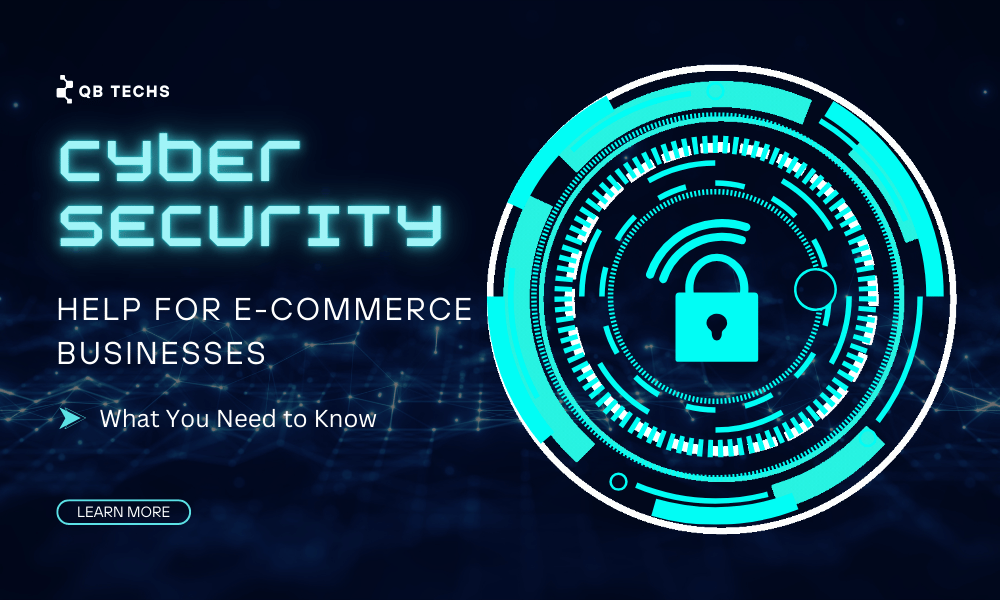Cybersecurity plays an integral part in safeguarding online websites from any hacking, scams, or any other sort of cybersecurity threat. Every entrepreneur is required to ensure that their firms are using enough security measures to prevent data breaches and respond effectively to a successful breach of security, whether it is an enterprise level or a small business operation. Although Ecommerce businesses encounter notable risks, the best cybersecurity practices and cybersecurity help would remediate and mitigate several security issues. In our post, we will explain the impact of cybersecurity on Ecommerce businesses and the way it can help mitigate the major cyber risks.
Why Does Safety Matter in Cybersecurity?
Ecommerce security comprises following the protocols that guarantee secured transactions online. It is analogous to the way the physical stores employ proper security measures such as surveillance cameras or guards that help deter theft. In contrast, online stores safeguard themselves against cyber threats. The core foundation of cybersecurity is online security and the protection of consumer data. However, we will now find out the reason behind the importance of security in Ecommerce.
Typically, there are about three primary reasons as follows:
Safeguarding Client Data
Safeguarding user data and the client’s safety generally constitutes one of the top-most priority tasks across the contemporary business sphere, with client data being a greatly worthy asset. At the same time, the data that is stolen becomes a severe reputational threat for different sorts of businesses. The majority of the modern cybersecurity measures enable better control of risks while safeguarding the data using varied methods out of the secured payment processing, policies to passwords, data encryption, two-factor authentication, and more.
Safeguarding Against Malware & Scams
Malware and spam are among the highly severe threats to online data protection. Modern cybersecurity methods allow for the creation of preventive protection against several forms of malware and spam by blocking dangers from accessing the main network, finding them, and removing them from the infected systems.
Safeguarding Networks From DDoS attacks
The highly challenging implementation of the required safety protocols enables additional protection of the eCommerce companies out of the DDoS attacks. Such attacks are considered cyberattacks, implying the flooding of websites from traffic out of numerous directions, resulting in them getting overloaded. Ordinary users will need access to it. The secure software and networks ensure better security to aid the firms in the prevention of such attacks or at least the outcomes of them.
Best Practices to Prevent Data Breach
Having an idea about data safeguarding and countering threats is where you have to undertake the right measures to opt for the proper software to safeguard data effectively. The ideal practices we have shared today will aid you in locating the appropriate point of focus whenever creating your online cybersecurity system.
Data Encryption
Encryption is the real solution whenever you plan to safeguard online transactions and E-Commerce data. These days, leaving the data entirely unencrypted indicates that you are voluntarily exposing it to third parties. The data should remain encrypted in flight as well as at rest.
Reputable Payment Services
One of the foundation stones to making money on the internet is distinctive payment services that become a part of the latent and explicit e-commerce processes in an organization. All the payment services work with sensitive data based on purpose, and as for the design, they can be the same, but performance and safety can differ. During the implementation of e-commerce systems, it is advisable not to skimp on funds on the payment service since the consequences of a data breach will be much more costly for the budget and image.
Reliable Passwords
Indeed, the idea of employing hard-to-crack passwords to enhance one’s security is probably as timeless as they come. Passwords such as “Johnny070489” or “qwertyasdf” will not afford any security to your corporate accounts and databases, as contemporary hacking tools can easily compromise the said passwords.
Here is the perfect example of a strong password: “q2o54B9!SM@l9&.”
Multi-Factor Authentication
Passwords, no matter how complex, can be cracked or stolen, posing a direct danger to customers’ data. The solution involves protecting the login process through the incorporation of multi-factor authentication. An employee will be required to enter an authentication code, usually in SMS or Google Authenticator, among other passwords, to gain access to sensitive information.
Responsible Data Retention
In the case of a database, consider storing only the needed data, and this too only for a certain duration of time. Thus, it becomes possible to prevent potential compliance problems and direct security activities to the right data.
Continuous Monitoring
The threats for any organization that is involved in the field of eCommerce can be lurking around the internet, from links in browsers to emails in a corporate organization. For the protection of systems, as well as to adequately and in time respond to the threats connected with cyber attacks, you are required to integrate the service of active security in the IT environment with constant control. When one gets alerted as soon as possible, then one can either neutralize the threats or reduce their severity even if the attackers are able to penetrate the vulnerable part of the system.
Thorough Testing
It is necessary to understand that IT environments and, in particular, security systems are also changing along with the emergence of threats and hacking methods. Following the integration of new solutions or modification of existing processes, your data protection solution should be checked to identify and fix the evolving security risks before the hackers seize the chance to exploit them. It is also useful to make a testing checklist of the most vital security aspects and not make a rollout of the updates into the production in which you are sure they supply the needed amount of data secureness.
Conclusion
The post aims to establish that cybersecurity in e-commerce projects is not only a compulsory element of contemporary business processes but also a competitive advantage. In any case, you should understand that, ultimately, there is no perfect protection against cyber threats. That is why the maintenance of security requires efforts continuously, and globally.




Leave A Comment
You must be logged in to post a comment.